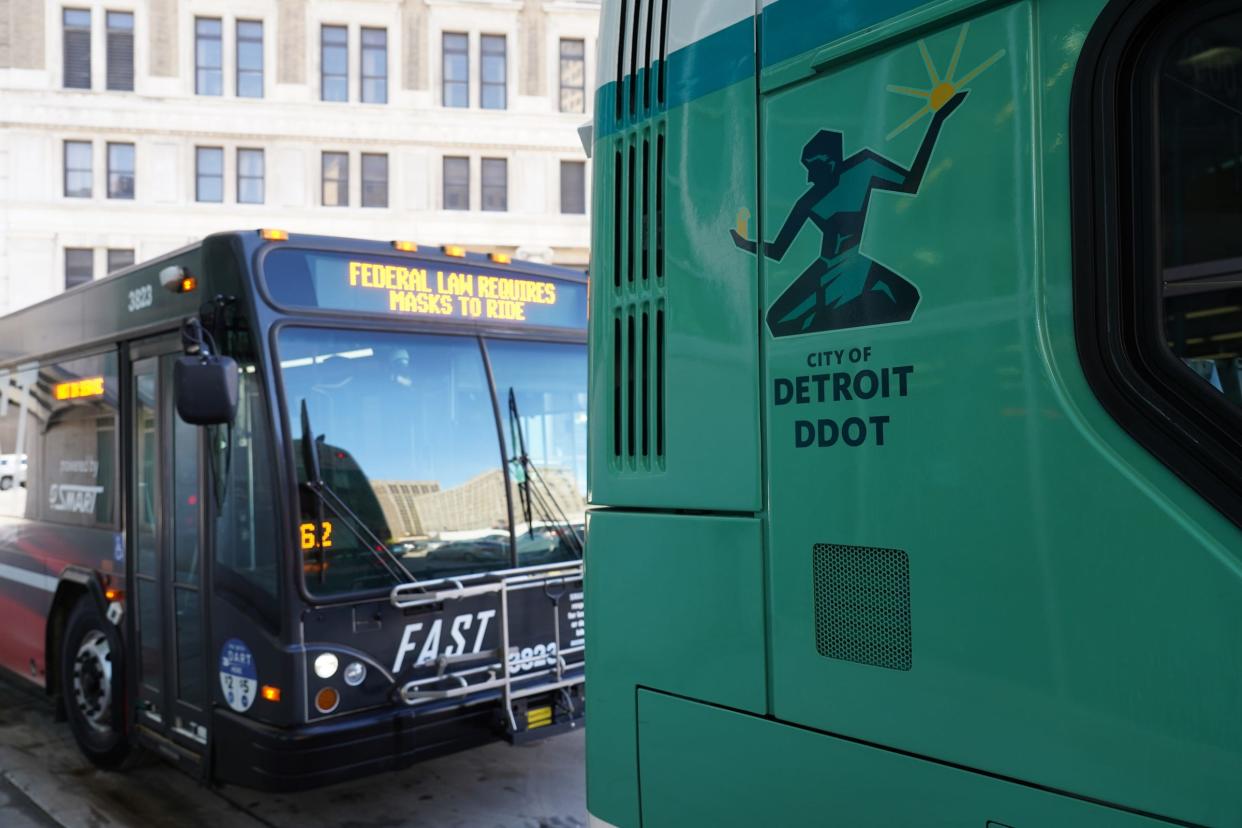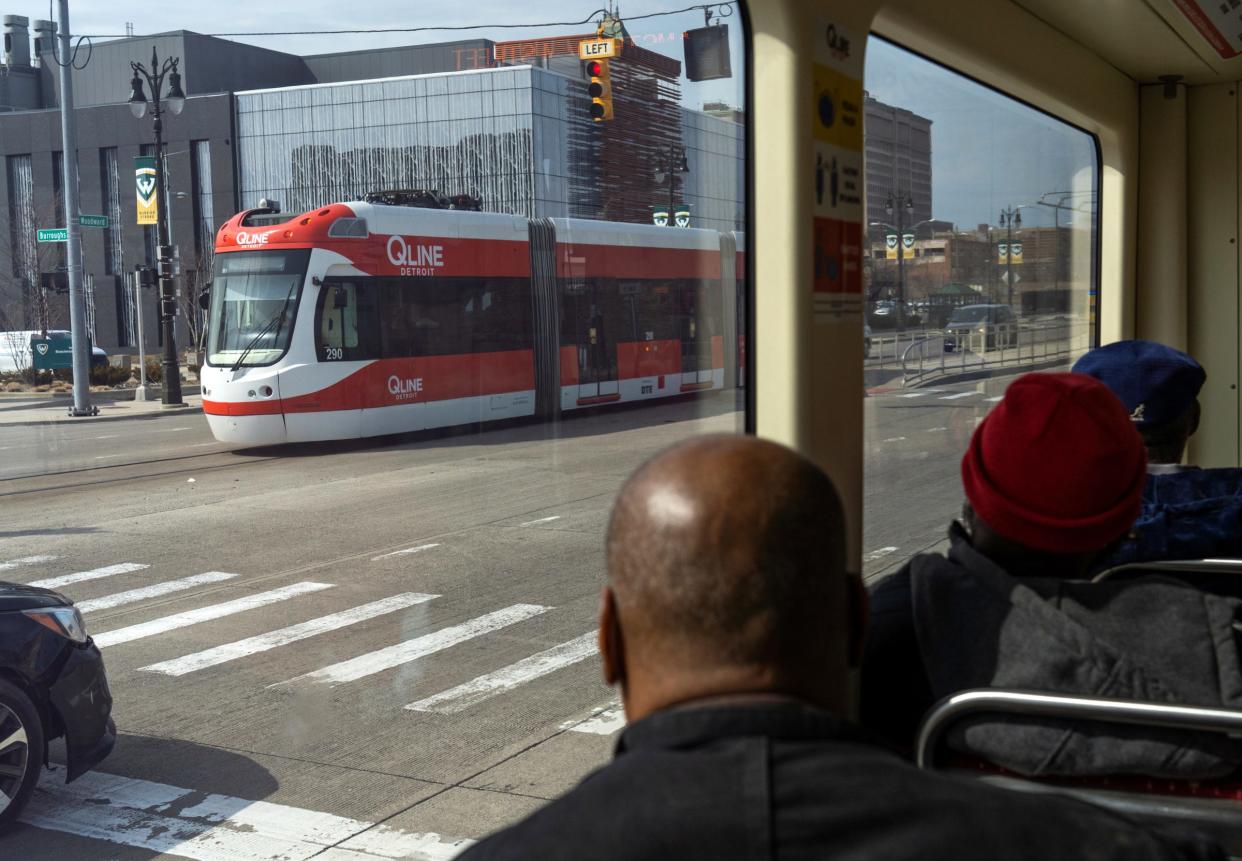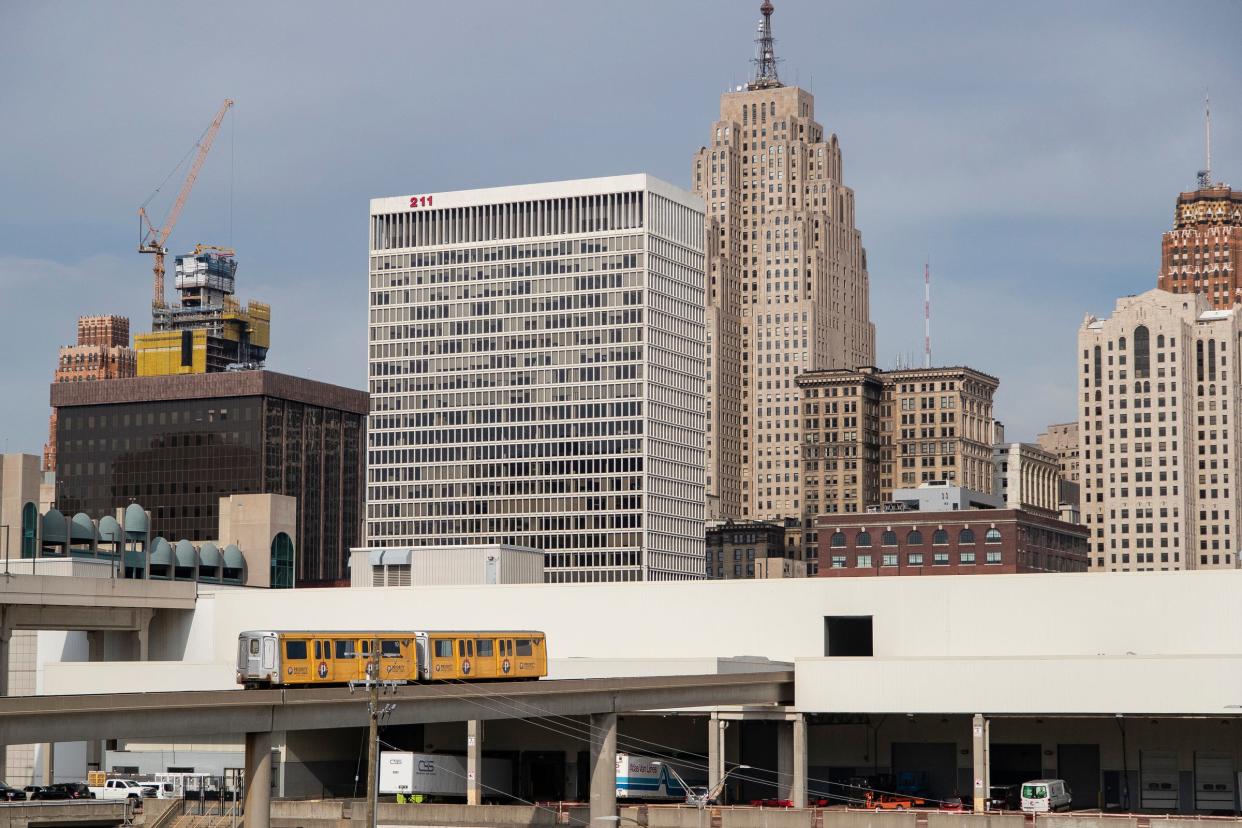Detroit Lions playoff games offer test, opportunity for public transit, too
When the Lions face the Buccaneers on Sunday afternoon in the NFL divisional playoff, it’ll be a test, not just of a pro football team from Detroit that’s suddenly got a good chunk of America rooting for it, but also of the region’s public transit system.
Can public transit offer a real alternative to driving in the Motor City for the thousands of people headed downtown on Sunday and for the many events planned for the coming months, like the upcoming NFL draft and NCAA men's basketball tournament games?
According to metro Detroit transit leaders this week, the answer is yes, even as there’s acknowledgment from some that things didn’t go so smoothly for travelers leaving downtown this past weekend.

Detroit will be changing directions
At a news conference across the street from Ford Field on Friday, Detroit Police Deputy Chief Franklin Hayes advised fans to pack their patience. Detroit will host not just the Buccaneers on Sunday, but also the Tampa Bay Lightning in a hockey matchup with the Red Wings.
He said the department has a plan that will include turning some two-way streets into one-ways to get everyone in for the playoff game and reversing that for folks leaving. Signage showing available exits and which way to go is planned, although Hayes didn’t say which streets would be affected.
“As of game day, we will look and we will see, and to a degree it’ll be dynamic,” Hayes said.
As for making sure public transit isn’t hindered, Hayes indicated that’s the goal.
“Understand that although there are thousands of fans here to this game, we still have metro Detroiters that have to get to work, so we have a plan that we will continue to make sure that public transit is not inhibited in any way, and those that elect to utilize it, they can get in and out without issues,” Hayes said.
Big events are nothing new for Detroit, including trying to wrangle all that extra vehicle traffic. Huge concerts, featuring everyone from Taylor Swift and Pink to Beyoncé and Metallica, made stops downtown this past year, but the word gridlock and its resulting frustration came up more than once in social media posts about the traffic situation downtown, particularly around Grand Circus Park, following the Lions’ dispatching of the Los Angeles Rams and their quarterback Matthew Stafford on Jan. 14.
More: Detroit People Mover to offer free rides in 2024
That traffic affected not just people stuck in their SUVs navigating the drive as well as the pricey parking, but also others who opted for the bus or the QLINE as an alternative. For any folks new to Detroit, especially any Buccaneers fans wearing pirate garb who think 45 degrees counts as cold weather, the QLINE is Detroit’s 3.3-mile streetcar line that runs on Woodward Avenue, a few blocks from Ford Field. Lengthy waits in the cold on Jan. 14 prompted some to try walking or ride-hailing as they changed plans on the fly after the Rams-Lions game.
It’s not just the transit systems that play a role in getting people around. It also involves traffic control and police, and when weather is a challenge as it has been recently, the people who keep the roads clear. The most recent home playoff game, while a welcome change for a long-denied fan base, offered a shorter preparation window than the regular season.
What happened last weekend
For Michael Staley, Detroit’s interim executive director of transit, the thing that makes the most difference for smooth-running public transit in big event situations is coordinated planning, which officials say has been happening this week. Staley said DDOT didn’t experience major disruptions for its buses on Jan. 14 nor was there a big uptick in traffic, in large part because while DDOT serves the city, it doesn’t operate the routes likely to bring the most people into the city for big events.
We’ll offer some tips for taking transit to this Sunday’s matchup after we delve into what happened last weekend. QLINE spokesman Dan Lijana summed up a couple of key issues:
“Sunday’s combination of snow, extreme low temperatures and a high volume of traffic impacted travel times for everyone, including the QLINE. Ensuring that snow plowing along the route does not cause blockages for the streetcar continues to be our top service priority during extreme winter weather. We are working with partners along the route, the city of Detroit and (the Michigan Department of Transportation) to address that concern.”
Public transit in metro Detroit has come in for its share of criticism over service delays and other issues over the years. DDOT and SMART have cited a driver shortage, although a recent pay increase at DDOT and labor negotiations at SMART are expected to help make salaries more attractive.

QLINE issues have stemmed in large part from the fact that it runs with traffic and can be disrupted by improperly parked vehicles. Officials have tried to address those issues through technology to give the streetcar signal prioritization at 26 traffic lights, and with the addition of a tow truck and a transit-only lane designation during events at Little Caesars Arena. The People Mover is limited by its size, as a 2.9-mile loop, although Mayor Mike Duggan recently suggested a possible reconfiguration.
More: DDOT, SMART bus riders to use new app for digital passes
Megan Owens, executive director of the advocacy group Transportation Riders United, however, said everyday and special event service, such as for big games, offer relatively different challenges for transit.
“Special event reliability is more an issue of traffic flow,” she said, noting that heavy traffic around venues can prevent buses and streetcars, for instance, from being effective if they get stuck, although transit providers can do their part by adding vehicles and operators.
Rob Morosi, a spokesman for the Michigan Department of Transportation, said, “it’s important to recognize the volume of pedestrian movements, car sharing utilization and public safety concerns by law enforcement during these types of events will lead to increased congestion.” He said “regular meetings are currently taking place ahead of major events for 2024 including the NCAA tournament, NFL draft, Grand Prix, etc. to plan for safe and efficient movements for all modes of transportation.”
Ben Stupka, executive director of the Regional Transit Authority of Southeast Michigan, said this past weekend was a bit more challenging than normal for transit, given the number of people and that the game wasn’t planned earlier, combined with cold temperatures. He cautioned that that’s not an excuse for service that didn’t go where it needed to go, however.
“We all have to do better,” he said.
A tweet from the RTA asking, “If you didn't take transit and plan to go downtown again this weekend for the second playoff game, did you learn your lesson yet?” prompted some frustrated responses from folks describing their challenges using public transit during the last Lions game. Stupka said the RTA’s intent wasn’t to be unsympathetic but rather to promote public transit, which he does believe offers a good value compared with driving and parking. He predicted that services would operate more smoothly this weekend.
Stupka also suggested that anyone interested in trying public transit who hasn’t done so before in Detroit might consider the QLINE or Detroit People Mover, an elevated rail loop through downtown, as good entry points. Stupka suggested the smartphone Transit app, covering many cities including Detroit, as a great way to plan trips around town.
Here are some of the transit options if you are heading downtown Sunday (websites are listed for various services, but for updates, check their social media feeds on X (Twitter), Facebook, etc,):
SMART and DDOT
Metro Detroit has two main bus systems, one run by the Detroit Department of Transportation and one run by the Suburban Mobility Authority for Regional Transportation, better known as SMART — smartbus.org. The most popular option for anyone planning to use public transit to get into the city for the game Sunday will probably be the SMART FAST bus, a limited-stop and thus speedier service, with routes on three main corridors, Woodward, Gratiot and Michigan, that all have stops downtown within blocks of Ford Field (261 Michigan serves Detroit Metro Airport). On Sunday, the 261 Michigan will run 10 a.m.-8 p.m., 461/462 Woodward is scheduled for 11 a.m.-8 p.m. and the 563 Gratiot is scheduled for 10:30 a.m.-9 p.m. Buses will run every 30 minutes instead of the normal hourly schedule, according to Bernard Parker III, SMART’s vice president of external affairs. Parker said the system will do its best to make sure buses are on time and employees are at work, and he encouraged travelers to check for service updates on SMART’s social media channels.
DDOT — detroitmi.gov/departments/detroit-department-transportation — will have the same plan in place that it did on Jan. 14, with about six buses and additional staff stationed on standby at the Rosa Parks Transit Center in case they’re needed. They weren’t needed during the last game, Staley said. DDOT plans to run its regular Sunday service.
SMART and DDOT offer a range of fares and passes, including 4-hour and 24-hour Dart passes at $2 and $5, respectively, allowing unlimited rides on both. Reduced fares are available for those who qualify. Passes can be purchased using the Token Transit smartphone app.
QLINE and Detroit People Mover
Both the QLINE streetcar — qlinedetroit.com — with regular stops on Woodward a few minutes' walk to and from Ford Field as well as Little Caesars Arena; and the People Mover — thepeoplemover.com/riding-info/schedule#inner-content — with a stop at Grand Circus Park, are free to ride. The People Mover has extended hours this Sunday (it would normally close at 8 p.m.), from 10 a.m. to 10:30 p.m. The QLINE operates 8 a.m. to 9 p.m. on Sunday.

D2A2
The RTA offers a regular direct bus route connecting Detroit and Ann Arbor, at Grand Circus Park near Ford Field and the Blake Transit Center, respectively. Trips are offered throughout the day and evening Sunday. Standard one-way fares purchased at the bus are $8, but there are discounts available. Go to d2a2.com for additional details and the schedule.
The RTA also plans to launch an express bus with 16 round trips each day connecting downtown Detroit and Detroit Metro Airport beginning in March.
More tips
Regular SMART user Chuck Altman, of Royal Oak, offered a few tips for folks considering taking the bus to the game or other big events:
With the Transit app, you'd be able to see at least 20 minutes ahead of time if the FAST bus is on its way and likely to arrive on time. If you don't see the radio waves on the app which indicate that you're looking at a real-time arrival estimate, I'd call SMART's Customer Service — 866-962-5515 (SMART's Parker said the call center should be staffed on Sunday) — and confirm whether a bus is truly on the way. They can check with dispatch. I've done that a couple times, and it was helpful.
Drive to the bus stop even if you usually walk to the bus. That way you'd have a Plan B if the bus is significantly delayed.
If you have an expensive ticket to an event and don't want to risk being late, consider taking an earlier bus than you might typically.
Public transit routes in downtown Detroit
Among the options for public transportation in downtown Detroit are DDOT buses, the People Mover and the QLINE.
People Mover route
QLINE route
DDOT bus routes
SOURCE City of Detroit
Contact Eric D. Lawrence: elawrence@freepress.com. Become a subscriber.
This article originally appeared on Detroit Free Press: Detroit Lions playoff games offer test, opportunity for public transit
